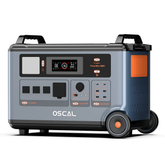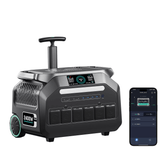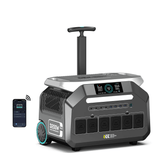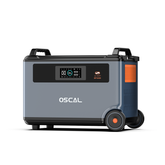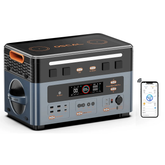Top 10 Reasons Why Solar Generators for Home Backup Are the Future of Reliable Power
When the lights go out, the first thing most homeowners reach for is a backup generator. But in recent years, solar generators for home backup have rapidly become the preferred choice for reliable, clean, and quiet energy. Whether it’s a sudden power outage, a seasonal storm, or just your desire to live more sustainably, a high-quality solar generator can keep your home running smoothly without the noise or fumes of traditional gas-powered units.
This guide explores everything you need to know about solar generators for home backup — how they work, why they’re worth the investment, and which features to look for when choosing one for your home.
1. What Are Solar Generators for Home Backup?
A solar generator is a compact energy storage system that captures and stores electricity from the sun. It typically consists of three main components:
- Solar panels – to collect sunlight and convert it into electricity.
- Battery storage – to hold the generated energy for later use.
- Inverter – to convert DC power into AC power for household devices.
When used as a home backup system, a solar generator provides instant power during outages. Unlike fuel-powered generators, solar systems operate silently, require no gasoline, and emit no harmful exhaust.

2. Why Choose a Solar Generator for Home Backup Instead of Gas or Diesel?
- Silent operation – No loud engine noise disturbing your family or neighbors.
- No fuel cost – Once installed, the sun provides free, renewable energy.
- Low maintenance – No oil changes, filters, or mechanical breakdowns.
- Eco-friendly – Zero emissions, no carbon footprint.
- Indoor safety – Unlike gas generators, solar ones can be used safely indoors.
3. How Much Power Do You Need for Home Backup?
Before buying a solar generator, determine your total power needs. Start by listing the essential appliances you’ll want to run during an outage:
| Appliance | Average Power (W) | Estimated Runtime with 2000Wh Solar Generator |
|---|---|---|
| LED Lights (5 bulbs) | 60W | 30 hours |
| Wi-Fi Router | 20W | 90 hours |
| Refrigerator | 150W | 10–12 hours |
| Laptop | 60W | 25 hours |
| Phone Charger | 10W | 180 hours |
If you want to run larger appliances such as washing machines, microwaves, or medical equipment, you’ll need a high-capacity solar generator for home backup — typically 2000 Wh and above.

4. Key Features to Look for in Solar Generators for Home Backup
a. Battery Capacity (Wh or kWh)
This determines how long the generator can power your home devices. For full-house backup, look for models with 2 kWh – 6 kWh capacity or expandable battery options.
b. Power Output (Wattage)
A generator rated at 2000 W – 3000 W continuous power can handle most essential home appliances. Make sure it also supports high surge power for devices like refrigerators or pumps.
c. Charging Options
Modern solar generators support multiple charging methods — solar panels, wall AC outlets, and car chargers. Some even offer dual-charging to recharge faster.
d. Battery Type
Choose models with LiFePO4 batteries for longer lifespan and safety. They can last up to 3000 – 5000 charge cycles, far exceeding traditional lithium-ion batteries.
e. Smart Display & App Control
Real-time monitoring of input/output wattage, battery percentage, and charging status helps you manage your energy use efficiently.
5. How Long Do Solar Generators Last?
A high-quality solar generator for home backup can last up to 10–15 years with proper care. LiFePO4 batteries degrade much slower than standard lithium-ion cells. Solar panels can last 20 – 25 years, ensuring reliable power for decades.
6. Best Use Cases for Solar Generators at Home
- Emergency blackouts: Keep lights, Wi-Fi, and communications running.
- Home office backup: Power laptops, routers, and monitors during outages.
- Medical devices: Ensure uninterrupted operation of oxygen concentrators or CPAP machines.
- Refrigeration: Prevent food spoilage during long outages.
- Home security: Maintain alarms and surveillance systems.
7. Can Solar Generators Run an Entire House?
Technically, yes — but it depends on your energy demand. For short outages, a portable solar generator for home backup can cover essential devices. However, for full-home power, you may consider expandable solar generator systems that connect to additional battery packs or integrate with rooftop solar arrays. Some advanced setups even connect to home electrical panels for automatic switching during outages.
8. How to Recharge Solar Generators Efficiently
You can charge solar generators for home backup in three main ways:
- Solar Panels – Most eco-friendly method; charging time varies from 4–8 hours depending on sunlight and panel wattage.
- AC Wall Outlet – Fast and convenient, often recharges within 2–3 hours.
- Car Charging – Useful in emergencies or during travel.
For best results, choose a generator that supports dual input charging (solar + AC simultaneously), allowing you to top up faster.
9. How to Size Solar Panels for Your Generator
If your generator has 2000Wh capacity and you want to recharge in a single day:
- 200W solar panel can recharge ~20–30% per sunny hour.
- 1000W panel array can fully recharge in 4–5 hours of direct sunlight.
Always consider peak sun hours in your region when planning solar panel wattage.
10. Maintenance Tips for Longevity
- Keep batteries between 20–80% charge when storing long-term.
- Clean solar panels regularly to ensure optimal absorption.
- Store generator in a cool, dry environment.
- Check cables and connectors for wear or corrosion.
11. Cost Considerations
Prices vary based on capacity and brand. Small 500Wh units may cost $500–$800, while full-home backup systems (3–6 kWh) range from $3000–$7000. Consider lifetime value — low maintenance and renewable energy often offset the initial cost over years.
12. Safety Considerations
- Never overload the generator — check wattage limits.
- Use only certified solar panels and connectors.
- Avoid exposing batteries to extreme heat or moisture.
- Keep generator away from children and pets during operation.
13. Conclusion
Solar generators for home backup provide quiet, clean, and reliable power during emergencies, and are a sustainable alternative to traditional gas or diesel generators. By assessing your power needs, choosing the right capacity, and maintaining your system properly, you can ensure your home remains powered when it matters most.
Invest in a high-quality solar generator today, and enjoy peace of mind knowing your home has reliable, renewable energy at all times.

